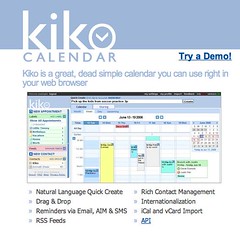Coordinating Company Calendars

I know there are tons of online calendars out there, but what caught my attention from Kiko is the fact that it was sold off eBay for $258.1000, to Tucows, the popular Internet services site. The functionality and its level of sophistication were the main reasons why Tucows decided to acquire Kiko.
A calendar serves as a vital function for you and the people you work with, especially if you’re fighting over the use of a conference room or want everybody at a big meeting at a certain time. You probably wouldn’t use separate calendars for personal and business use, but to keep it all together. Kiko makes it extremely easy to do this efficiently and across operating systems since it’s web based. The functions on Microsoft Exchange are fairly decent, but unfortunately you can only use those on a PC. Kiko makes it more than easy to keep up with your colleagues without a barrier.
I was impressed on how seamlessly it imported my iCal files. Now my calendar on Kiko reflects what’s in my iCal. Whenever I need to, I can sync Kiko with iCal together with no problems and have access to my calendar anytime from a web browser anywhere in the world. Keep in mind that your contacts can also be imported via your vCard files..
Kiko allows me to view not only my calendar, but anyone else’s on my contact list, as long as their appointments are marked as shared. Not to worry if you have some personal arrangements you don’t want to broadcast. You have the option to share only selected engagements with those in your contact list. If you happen to keep in touch with people or do business with people internationally, Kiko supports 14 languages. Some of these include Japanese, French, German, Italian, Swedish or Hebrew.
To add to Kiko’s simple complexity, you can do RSS feeds for your upcoming appointments and recently changed appointments by clicking the provided links and copying them into your feed reader. Badges can be added to a personal webpage to give people access to your public calendar. As with the RSS feed, all you need to do is the copy the HTML code into the appropriate area of your webpage. Event rolls can be created the same way for your website or blog.
Kiko is Ajax-based, and I’m not talking about the bathroom cleaner. It’s too complicated to explain in detail, but in a nutshell, Ajax stands for Asynchronous JavaScript and XML, a technique used in web application development. It basically eliminates the start-stop-start-stop nature of a website, and makes loading it seemingly smoother. Google and Amazon also use this.
For you folks looking further for a business solution, Kiko is looking to offer a hosted option where the business would receive its own subdomain (http://yourcompany.kiko.com) and database. Or another idea had is to provide a business with its own Kiko Calendar server to run on its network.
Overall I was impressed with Kiko’s effortless features and the clean-cut look with all that it is capable of. Try Kiko for yourself at www.kiko.com.


0 Comments:
Post a Comment
<< Home